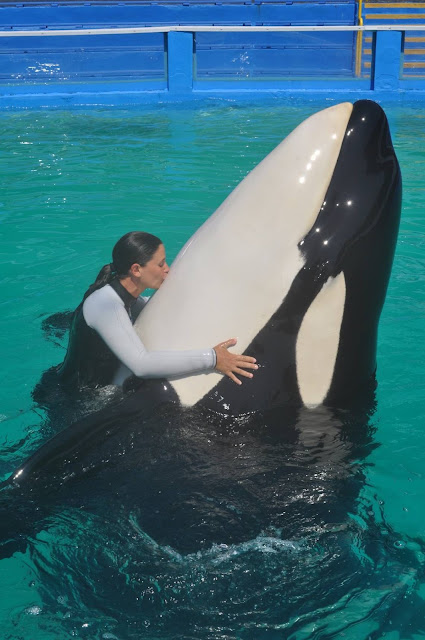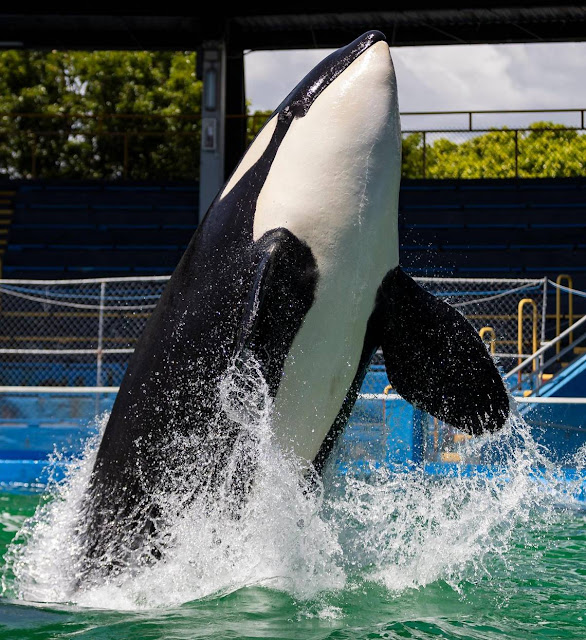For longtime residents, Lolita the Orca whale and performer at Seaquarium was not only synonymous with Miami, she was a beloved local mascot. Just like Mickey Mouse is the magical symbol of dreams in Orlando. But Lolita was a real whale. The news of her sudden passing on August 18, 2023, left everyone shocked and heartbroken-- fans, residents, trainers, staff, and animal activists.
DID CAPTIVITY KILL LOLITA?
So, did captivity kill her as claimed by PETA and other animal activists? We gathered all the facts.
1. Lolita lived longer than the average female orca. In the wild, the average lifespan of a female orca is 46 years, with a maximum of 90 years, according to the Whale and Dolphin Conservation. In comparison, the average lifespan of a male orca in the wild is 30 years, with a maximum of 60 years. Lolita was 57 years old.
The feds noted that the facility failed to monitor and maintain the chlorine levels in Lolita's pool. It was a delicate balance — too much chlorine could cause chemical injury, while not enough could allow harmful pathogens to flourish in the small tank. The tank had a recirculating water system, where disinfectants were essential to remove fecal contaminants and pathogens.
A cut in Toki’s daily diet starting two years ago was likely a factor in her death from renal failure, said Wood, Wallace and Toki’s [Lolita] former vet of 23 years, Dr. Magdalena Rodriguez. Toki’s food intake was reduced from 160-165 pounds of fish per day to 120 pounds because Seaquarium’s new curator and head trainer at the time decided Toki was too fat. “Her food is where she gets her water and she wasn’t getting enough water,” Wallace said. “She had pre-existing renal disease, and she had elevated kidney enzymes in 2021, exacerbated by a decrease in her diet. When cetaceans become dehydrated, they can also become prone to illnesses such as pneumonia. I suspect she was chronically underfed and dehydrated over the last two years and never fully recovered and had the appetite she had previously.” (Miami Herald, August 25, 2023)
The longtime vet, Magdalena Rodriguez, was fired in June 2021 after alleged fallout from her relaying her safety concerns about Lolita and other marine mammals to the USDA. Dr. Jenna Wallace says she was pushed out of her job at the Seaquarium that summer after supporting Rodriguez and the USDA investigation. (New Times, August 22, 2023)
6. The necropsy showed that Lolita died of old age and chronic illness.
Dr. Judy St Leger, a veterinarian with 20 years of experience working with marine mammals, conducted the necropsy. She found Lolita suffered from “acute and chronic broncho interstitial pneumonia and renal degeneration, and a chronic condition of the heart implying the degeneration of the cardiac valves."
Monthly health reports issued by McBain call into question whether Lolita ever truly recovered. The infection persisted throughout 2022, and she had ups and downs, sometimes losing her appetite, appearing listless, and teetering on the verge of fatal illness. She took a turn for the worse in September 2022 but seemed to recover after a new antibiotic was added to her regimen. (New Times, August 22, 2023)
 |
| Marni Wood, head trainer, kisses Lolita |
MARCH 2023, PLANS WERE ANNOUNCED TO RELEASE LOLITA TO HER NATIVE WATERS IN 2025. But there was a major problem.
A group called Friends of Lolita in conjunction with the Whale Sanctuary Project reached an agreement with the new owners of Seaquarium (who took over in 2022) to release Lolita in a sea pen in Puget Sound. Funding was estimated at $15-$20 million with a pledge from NFL owner Jim Irsay for $5million. While plans were underway to prepare Lolita, there was still a major hurdle. This would require federal and state approval and the pen had not been built. Despite all the hype in the media after the news of Lolita's passing surrounding her impending release, that dream was still far from reality.

Lolita performing with her trainer Marni Wood
 |
| Lolita performing with her trainer Marni Wood |
TRUTH4TOKI
A group led by former trainers called Truth4Toki warned that a stressful move to an unfamiliar place after 53 years of dependency on humans was too dangerous for the whale, given her advanced age and health problems. They advocated for Toki to be removed from Seaquarium and relocated to SeaWorld in Orlando, where she could spend her last years in a much larger facility. (Miami Herald, Aug 25, 2023)
OUR CONCLUSION
The golden rule is to think with our heads and not our hearts and to remember that whales, like stray cats we take indoors away from their natural habitat, learn to adapt to their new home environment after many years. We would never release a senior suffering cat outside to an unknown environment, nor should we do the same to a whale. Size does not matter. Age, health, and a known environment have the most impact.
Her passing away in Miami is bittersweet. There is relief that Lolita died at home in Miami but sadly was surrounded by strangers and not her longtime caretakers.
Regardless, the overall lesson through this experience, is that orca whales should not be captured, taken from their natural habitat and held in captivity. Unlike stray cats in city streets with no clean food options, and dogs dependent on humans, orca whales have plentiful food sources and can survive on their own. Rescuing injured or sick animals to treat them and release back into the wild is a separate cause.
 |
| (Photo by Leonardo DaSilva via Flickr) |
Swim freely Lolita, swim freely and watch over us as we cross the ocean.


















0 comments:
Post a Comment
Thank you for sharing your comment and supporting this website and the solution to reverse homeless pet population.